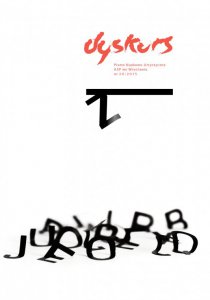Écrire, C'est tenir (« Information Man » n°2)
WRITE TO SUSTAIN. Info Man 2
Author(s): Leszek BrogowskiSubject(s): Language and Literature Studies, Literary Texts, Fine Arts / Performing Arts
Published by: Akademia Sztuk Pięknych im. Eugeniusza Gepperta we Wrocławiu
Keywords: literatura; książka artysty; egzystencja; aktywność; sztuka; funkcja języka
Summary/Abstract: Leszek Brogowski’s article consists of two parts. The first describes brieflythe writing by artists published in Éditions Incertain Sens, a Frenchpublishing house specializing in books by artists. Although the art of thetwentieth century might seem more and more abstract, elitist and remotefrom everyday affairs, artists in various ways tried to bring it close tolife. These efforts are worthy of our attention because they are often anexpression of the concept of art being a guardian of life: art as a kindof existential discipline presented in the form of literature, and thus thebooks. The next part of the article is devoted to the six artists: LaurentMarissal, Bruno Di Rosa, Lefevre Jean Claude, Erik Watier, Hubert Renard,Pascal Le Coq. The title of each section is a quote taken from statementsby artists published in different texts. The play, which often saves ourlives. I just finished „Pinxit III” (Laurent Marissal, e-mail). With this dailypractice, I know that I exist (Bruno Di Rosa in conversation). Constant ditheringwhat preoccupies us, and then – perhaps – depends a person (LefevreJean Claude, in one of his texts). Write it ourselves – an American artistand the founder of the Antinomian Press publishing house – tells the storyof contemporary art, Ben Kinmont (excerpt about Eric Watier). I write thatname, which tell us that it is ours (quote from James Joyce’s Ulysses as thetitle of a piece on Hubert Renard). Various statements about the doublemeaning (quoted from Freud as the title of a fragment on Pascal Le Coq).The conclusions of the first part of the article emphasize the relationshipbetween writing practices of artists and the conviction (closer topragmatism than structuralism, which dominated from the 1960’s to the980’s) that linguistic practices are directly connected with daily operationsand activities; the goal of this article is to analyze the function oflanguage, which links artistic practices.The second part of the article refers to text that Ed Ruscha wrote in 1971.It was entitled Information Man. He highlighted the presence of books ineveryday life, and therefore also their potential to adapting in an avant--garde project of reconciliation of art and life. In 1962, Ruscha publishedat his own expense Twentysix Gasoline Stations, one of the first books byartists that started this collective, avant-garde project. The subject ofthe Information Man is omniscient author who – in the fashion of both anaccountant and a police agent – describes what happened to the copiesof the book. Only thirty-two copies were used; thirteen of them servedfor pressing sheets of paper or other small items. Seven served as a floatfor flies, mosquitoes and other small insects, and two for the purpose ofself-defense. Ten copies helped to support heavy doors and because theywere packaged of ten, one package was used to block the door, etc.Beautiful intuition: the book so much caught up in daily life that it couldsometimes be used not only for reading. But the reality goes beyond Ruscha’sfiction, as evidenced by numerous quotations from the diaries byVictor Klemperer, which are included in the second part of the article andcan be considered as contribution to a hypothetical text entitled Info ManNo. 2. Buying and borrowing all kinds of books, magazines and newspapers,was in fact forbidden to a wearer of star. / What one secretly keptat home, was a source of danger and had to be concealed under cabinetsand carpets, in ovens and cornices or kept with coal as a material forkindling. Survivor of the destruction of Dresden, Klemperer so ends LTI.Notebook by philologist: I wanted to separate the balancing rod from therest and only sketch still holding hands. This is how this book was written[…]. Write to follow.
Journal: DYSKURS Pismo Naukowo-Artystyczne ASP we Wrocławiu
- Issue Year: 2016
- Issue No: 1 (20)
- Page Range: 70-91
- Page Count: 22
- Language: French

